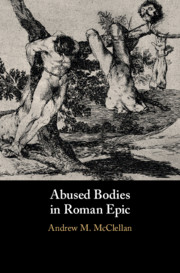
-
Select format
-
- Publisher:
- Cambridge University Press
- Publication date:
- July 2019
- July 2019
- ISBN:
- 9781108697118
- 9781108482622
- Dimensions:
- (228 x 152 mm)
- Weight & Pages:
- 0.62kg, 318 Pages
- Dimensions:
- Weight & Pages:
- Subjects:
- Classical Studies, Classical Literature
You may already have access via personal or institutional login- Subjects:
- Classical Studies, Classical Literature
Book description
Greco-Roman martial epic poetry, from Homer and Virgil to Neronian and Flavian epic, is obsessed with the treatment of dead bodies. Sometimes corpses take centre-stage in grand funerals; sometimes, disturbingly, they are objects of physical violence or malign neglect. In this book - the first full-length examination of corpse mistreatment in epic - Andrew M. McClellan explores the motif of post mortem abuse in Greco-Roman epic, especially the Latin poems of early imperial Rome: Lucan's Bellum ciuile, Valerius Flaccus' Argonautica, Statius' Thebaid, and Silius' Punica. He counters the pervasive tendency to view epic violence from the perspective of the abuser by shifting the focus to the object of abuse. In signalling the corpse as a critical 'character' and not simply a by-product of war, he offers a fundamental re-evaluation of violence and warfare in Latin epic, and through close study of intertextualities indicates the distinctive features of each author's treatment of the dead.
Reviews
'… M.’s thoroughly researched and authoritative study is undoubtedly a very valuable contribution to the field and will be of interest mainly to readers already familiar with the epics of Lucan, Statius, Valerius Flaccus and Silius Italicus.'
Giles Gilbert Source: Classics for All
‘… energetic and creative … an excellent review of the poets’ historical circumstances, which may account for some of the differences in their approach to corpse abuse.’
Neil Bernstein Source: Bryn Mawr Classical Review
Contents
Metrics
Altmetric attention score
Full text views
Full text views help Loading metrics...
Loading metrics...
* Views captured on Cambridge Core between #date#. This data will be updated every 24 hours.
Usage data cannot currently be displayed.
Accessibility standard: Unknown
Why this information is here
This section outlines the accessibility features of this content - including support for screen readers, full keyboard navigation and high-contrast display options. This may not be relevant for you.
Accessibility Information
Accessibility compliance for the PDF of this book is currently unknown and may be updated in the future.


